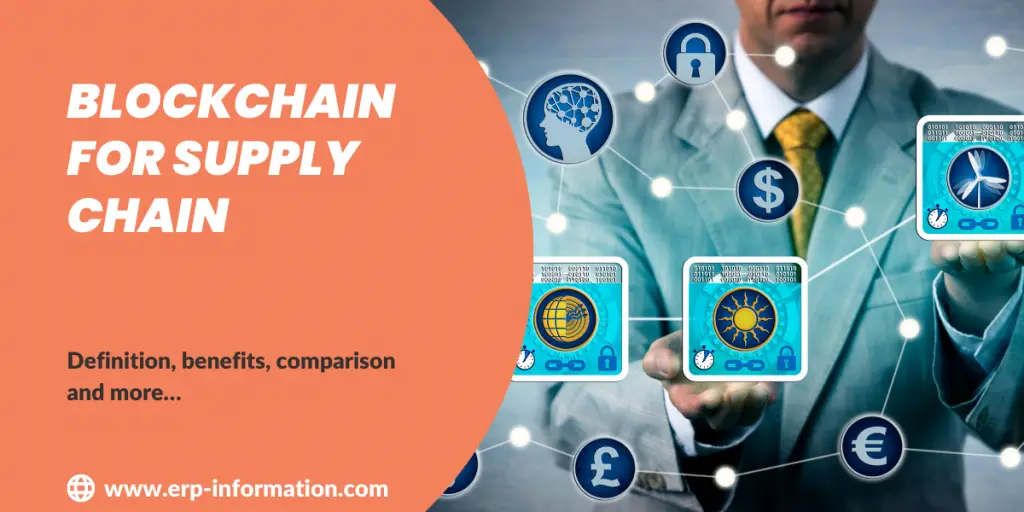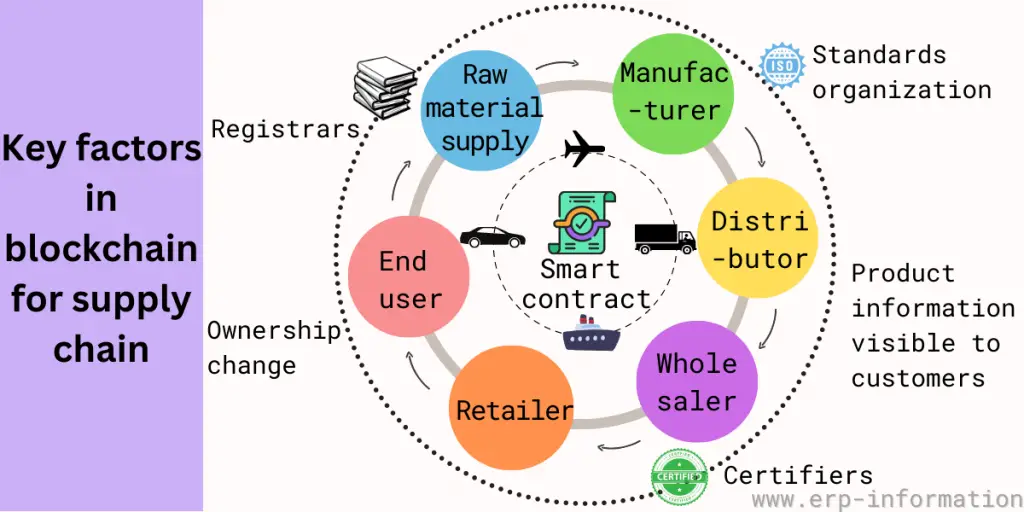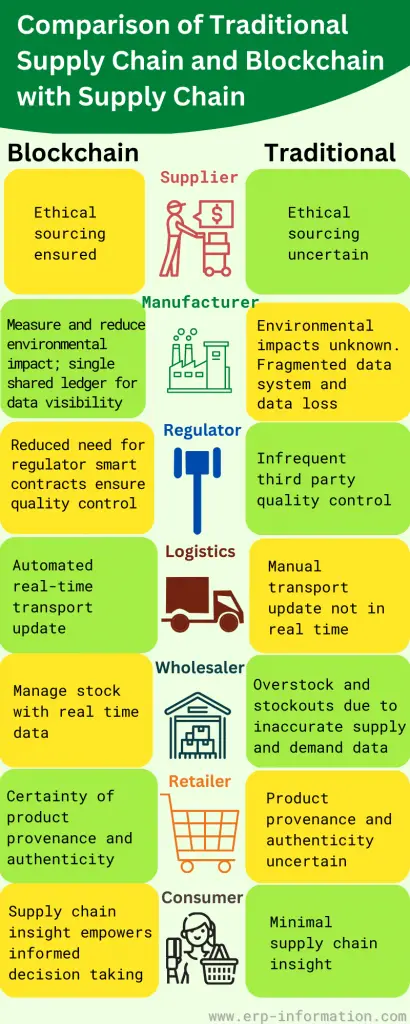With the global economy increasingly relying on international logistics, it is becoming apparent that traditional supply chain management methods are inefficient and insecure.
New problems like transparency in production and trust between buyers and sellers arise with new technology. But one emerging project could radically impact how goods travel and change hands worldwide, and that is the blockchain for supply chain.
In this article, we look into the potential of blockchain for supply chain to improve efficiency, security, transparency, and traceability. We also discuss the difference between traditional supply chain and blockchain for supply chain.
Overview of Supply Chain and Challenges
An effective supply chain is crucial for a business to run smoothly with profits. It is also important for customer satisfaction, reducing costs, and streamlining production. So, what is a supply chain? – it is a complex network of vendors, components, and processes that runs the production cycle required to bring a product from innovation to market.
It incorporates suppliers, raw materials delivery systems, technologies, and end-users to whom the goods are distributed.
Today’s supply chain is challenged by some issues, such as:
- Lack of transparency: No visibility into the operations may lead to cost and customer relationship issues, bearing a negative impact on the brand
- Ineffective risk management: Operations are susceptible to various risks, like fraud and code of conduct violations, and only effective handling of risks leads to efficient supply chain operations.
- Variability risks: Organizations have a high level of risk because their supply chains are ever-expanding and involve multiple stakeholders, such as suppliers, distributors, and consumers.
- Abrupt demand changes: Businesses must respond quickly to sudden changes in demand more often, which can affect the supply chain.
- Overheads due to duplication: Product fraud or defects can cost extra.
Understanding the need for Blockchain for Supply chain
Global supply chains are a complex web of manufacturers, suppliers, and delivery services that coordinate to bring products from production to consumption.
The supply chain is typically a paper-based process to create an information repository, making it difficult or impossible to trace.
It is here that implementing a modern system like blockchain with unified data flows, secure transactions, and verifying technology can help organizations track all transactions more securely and transparently and reduce delays, mistakes, and expenses.
So let us further understand blockchain and how it can help the supply chain.
What is Blockchain?
A blockchain is a revolutionary approach to digital information storage that keeps it secure, accurate, and immutable.
It provides an incorruptible distributed ledger system operated across multiple computers in the network, ensuring all transactions are processed with total integrity – unaltered by any malicious or external forces.
Blockchain is a highly secure technology utilizing digital signature features to ensure fraud-free transactions. In addition, it is decentralized, allowing users to mutually agree on transactions without needing regulatory authorities.
This technology also offers automation capabilities, allowing it to generate systematic actions and payments when certain criteria are met.
Benefits of Blockchain in Supply Chain
Blockchain technology is changing the digital landscape and fundamentally transforming how we transact. With its secure, distributed ledgers and fraud-resistant signatures, it has become a reliable tool for conducting seamless transactions with mutual consent by eliminating the need to rely on intermediaries like governments or banks.
Moreover, due to its programmability feature, blockchain can create automated triggers that execute events such as payments when specified criteria are met while making operations more efficient at low costs!
Key Benefits of Blockchain for Supply Chain
- To track the material supply chain and help organizations corroborate with standards
- Provide reliable and fixed records of transactions and make payments efficient.
- Reduce losses incurred from fraud and black market trading
- Minimizing paperwork and unnecessary overheads by streamlining the processes
- Enhance the trustworthiness of the shared data.
- Minimize the risks of mismanagement or negligence.
- Better communication and collaboration
The three T’s of blockchain that helps transform the supply chain
- Transparency: Blockchain provides a way to securely store data that anyone can verify, which can be updated in real-time.
- Traceability: This can help organizations understand and manage their supply chains more efficiently. It can also help them provide consumers with transparent information about the products they purchase.
- Tradability: Blockchain offers a new way to trade things and helps users turn a commodity into a token as proof of ownership. The tokens can be traded like stocks without needing any physical object.
Traditional Supply Chain vs Blockchain Supply Chain
Blockchain Uses in Different Supply Chain Sectors
Finance
Blockchain offers businesses a way to save money and a grip over efficiency through streamlined and automated supply chain finance processes.
It also establishes trust between the participants in transactions while providing continuity and enabling long-term business success.
Mining industry
Blockchain is transforming mining operations by providing a way to ensure ethical sourcing and authenticity of materials.
It also increases transparency into the carbon emissions, water use, and costs associated with production, granting better insight into environmental impacts and creating new chances for sustainability.
Pharmaceutical industry
Here, blockchain is used to trace the origin of pharmaceuticals, the transport of drugs, and the procurement of raw materials.
It also minimizes the use of fraudulent drugs, reduces patient risk due to medical recalls, and reduces overall pharmaceutical expenditures.
Automotive industry
Auto manufacturers incur losses yearly due to damage, theft, and counterfeiting. Blockchain is adopted here to trace the spare part’s origin, verify authenticity with tamper-proof ledgers, and ultimately protect auto companies from fraudsters who want to sabotage customer satisfaction and steal through fake parts production.
It also aids in safety recalls of vehicles due to defective pieces via tracking.
Education
Institutions can ease course verification and completion using blockchain. Students can also maximize their learning potential with secure access to exams using computers while safely storing scores on a tamper-proof ledger.
Blockchain also helps educators deliver quality online learning experiences through trustworthy technology solutions.
Retail industry
Apparel and clothing often have intricate and multinational supply chains that quickly convert raw materials into finished products. This makes it difficult for companies to verify their origin and for customers to know if their purchases align with their values.
Blockchain can provide a more efficient way to track shipments and share information about the ethical provenance of apparel and shoes, preserving brand reputation, promoting customer loyalty, and ensuring compliance.
FAQs
How does blockchain improve supply chain transparency?
Blockchain ensures real-time, immutable records, allowing all participants to access and verify information, fostering trust.
How does blockchain streamline supply chain processes?
Blockchain automates processes through smart contracts, reducing delays and errors while providing a single source of truth.
Conclusion
Blockchain technology can transform the way the supply chain works fundamentally. It could create a more trustworthy and efficient system while reducing fraudulent activities and increasing visibility and collaboration.
Are you looking at implementing blockchain in your Supply Chain, and has this blog post been useful? Do you see other areas wherein blockchain can be cost-effective and competent?


